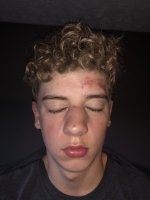You are using an out of date browser. It may not display this or other websites correctly.
You should upgrade or use an alternative browser.
You should upgrade or use an alternative browser.
Anybody see my kid eat it at OIR?
- Thread starter jj584
- Start date
MarctheSharc
PR Founding Father
The drop down Left hander ??
First lap ?
Or the right - just before the rollers ?
First lap ?
Or the right - just before the rollers ?
jj584
PR Addict
Drop down left hander. 3/4 of the way through the session, on a CRF250R #88.The drop down Left hander ??
First lap ?
Or the right - just before the rollers ?
MarctheSharc
PR Founding Father
I was in Group 3
Group 3’s second session had water thrown down in some areas. That being one of them.
Someone ate it in front of me in that area – but not 100% on who it was.
Dude grabbed a handful after the tight right and blitzed down the hill setting up for the left.
He got squirrely on the way down the hill and missed his mark.
Grabbed the brakes and that’s all she wrote …….
Both wheels slid out at the same time and he smacked down pretty hard.
I’m of the opinion that a good helmet should give itself (think crumble zone) in a crash.
The helmet takes the impact, transfers the energy by fracture and saves the head.
Group 3’s second session had water thrown down in some areas. That being one of them.
Someone ate it in front of me in that area – but not 100% on who it was.
Dude grabbed a handful after the tight right and blitzed down the hill setting up for the left.
He got squirrely on the way down the hill and missed his mark.
Grabbed the brakes and that’s all she wrote …….
Both wheels slid out at the same time and he smacked down pretty hard.
I’m of the opinion that a good helmet should give itself (think crumble zone) in a crash.
The helmet takes the impact, transfers the energy by fracture and saves the head.
MarctheSharc
PR Founding Father
Glad he's - OK -
I 'd say the helmet did it's thing
I 'd say the helmet did it's thing
GeorgiePorgie
PR Founding Father
Stay off the bike for a good while. Repeat concussions are brutal. Glad he’s ok.
Matt Berger
PR Member
Didn't see it live, but I was the first one to get to him. Threw my bike up against the tree and ran over. His face was pretty beat up (broken nose makes sense) and he kept saying his back hurt really bad, seemed like he got the wind knocked out of him pretty good. He was able to get his helmet off by himself before you got over to him, the crack in was wicked, must have been a hard hit.
Glad it was only a concussion and the broken nose, could have been a lot worse, that helmet did its job.
He'll be back on the bike in no time!
Glad it was only a concussion and the broken nose, could have been a lot worse, that helmet did its job.
He'll be back on the bike in no time!
jj584
PR Addict
Thanks for stopping for him, I was way on the other side. He’s still pretty sore but itching to ride again already. Out of school this week, hopefully cleared on Monday. He was in my field of vision than he wasn’t, happened quick.Didn't see it live, but I was the first one to get to him. Threw my bike up against the tree and ran over. His face was pretty beat up (broken nose makes sense) and he kept saying his back hurt really bad, seemed like he got the wind knocked out of him pretty good. He was able to get his helmet off by himself before you got over to him, the crack in was wicked, must have been a hard hit.
Glad it was only a concussion and the broken nose, could have been a lot worse, that helmet did its job.
He'll be back on the bike in no time!
Attachments
NQ1965
PR Elite
At least his nose is still fairly straight. My nose got broke coaching ball back when I was like 28. Bent it over pretty good, had to have it reset.
Agree with Georgie on the concussion. He may not be telling you just how bad it is, or was.
I don't think there's any doubt, he took a hard hit.
Agree with Georgie on the concussion. He may not be telling you just how bad it is, or was.
I don't think there's any doubt, he took a hard hit.
jj584
PR Addict
He failed the Dr’s test pretty bad, couldn’t recite the months of the year or give a three digit number back in reverse order of given. Balance was ok, but memory recall is poor and in conversation you can see him struggle a bit to find words. No rush to get on the bike, just hoping he doesn’t miss much school past this Friday.
GeorgiePorgie
PR Founding Father
Id stay off 6 months minimum. Longer if he’s still not right. It’s just not worth it. Repeat bangers can affect you for your entire life.
The brain takes longer to heal than bones. But we neglect the brain and cottle bones.....you can get away with riding on banged up ortho injuries but don’t chance it with the brain.
the research does say to take it easy, but not too easy either. It's kinda gray. But no more contact sports until his symptoms are fully resolved.... second impact syndrome is what really hurts people. Used to be we used to say oh you rung your bell you'll be ok. Well that wasn't the smartest way to go about concussions. Now we know that.
The brain takes longer to heal than bones. But we neglect the brain and cottle bones.....you can get away with riding on banged up ortho injuries but don’t chance it with the brain.
the research does say to take it easy, but not too easy either. It's kinda gray. But no more contact sports until his symptoms are fully resolved.... second impact syndrome is what really hurts people. Used to be we used to say oh you rung your bell you'll be ok. Well that wasn't the smartest way to go about concussions. Now we know that.
Last edited:
GeorgiePorgie
PR Founding Father
So, here's some info I found as it relates to concussions and adolescents in sports activities. You can't access this unless you are credentialed through a hospital or have a subscription to uptodate. But i'lll paste it here for some recomendations:
While they are recovering from concussion, athletes should also be restricted from activities where they may sustain head injury (eg, contact sports, skiing, skating, or cycling). Incomplete recovery may make the athlete more vulnerable to worsening of symptoms or more catastrophic head injuries in the event of recurrent collisions (ie, second impact syndrome).
Evidence supports sub-symptom threshold, aerobic exercise during recovery to decrease concussion symptom scores and duration of symptoms [25-31]. For example, in a blinded trial of over 100 adolescents with a sport-related concussion, subthreshold, aerobic exercise initiated within 10 days of the concussion significantly decreased the time to recovery compared with gentle stretching (median recovery time 13 versus 17 days, respectively) [31]. There was a trend towards a lower incidence of persistent postconcussive symptoms in the aerobic exercise group, but this finding did not achieve statistical significance. In this study, all patients underwent a baseline exercise tolerance assessment using the Buffalo Concussion Treadmill Test to identify the heart rate at which concussion symptoms worsened [32]. Individuals in the intervention group were then advised to perform daily aerobic exercise on a stationary bicycle or treadmill while wearing a heart rate sensor and to target their heart rate to 80 percent of the rate at which symptoms were exacerbated during the baseline assessment [31]. Duration of daily exercise prior to the follow-up visit was limited to 20 minutes or until symptoms developed, whichever was shorter. Similarly, in a retrospective, observational study of over 250 adolescents and young adults (median age 17 years), initiation of physical activity at one versus three or seven days was associated with a shorter time to full recovery (full return to school or work and full return to sport) [33].
By contrast, strict physical rest beyond 48 hours has been demonstrated to exacerbate self-reported symptoms and should be avoided [26]. For example, in a trial of almost 90 patients (11 to 22 years of age) with concussion, individuals who adhered to strict physical rest for five days had increased symptoms of concussion over 10 days compared with patients who were assigned to usual care (one to two days of rest followed by stepwise return to activity) [26].
Cognitive rest — Our approach to mental activity in children and adolescents with concussion is as follows:
●Symptoms worsened by cognitive effort – We suggest that patients who have sustained a concussion, are symptomatic, and have worsening of symptoms by activities such as reading, video games, or screen time avoid all mental activity that makes them feel worse, up to and including absence from school. [6,34]. Social visits both in and out of the home and trips should be limited. During this period of reasonable rest, the child may often engage in light mental activities, such as watching limited amounts of television and family interaction, without exacerbating symptoms [34,35].
However, close follow-up with a pediatrician, sports medicine specialist, or other capable provider is needed to help guide the liberalization of mental activity. Patients can return to school as soon as they can tolerate 30 to 45 minutes of concentration. In our experience, concussed patients typically require one to two days of reasonable rest before returning to school. To avoid the harm of prolonged absence from school, we usually return student athletes to school after a maximum of five days of rest.
●Asymptomatic or low-level symptoms – We suggest that patients who are asymptomatic or have low-level symptoms not worsened by routine mental activities receive anticipatory guidance that emphasizes avoidance of cognitive effort that cause a resumption or worsening of symptoms. In our experience, exposure to video games, loud music, prolonged screen time, or mental activities requiring high levels of focus and concentration (eg, taking standardized tests) are activities that frequently induce symptoms and need to be curtailed for a few days after injury. These patients may continue to attend school.
All children and adolescents returning to school after a concussion warrant monitoring of symptoms and academic adjustments (eg, rest break in the nurse's office or reduced class time (table 2)), as needed, if symptoms are exacerbated by schoolwork or the school environment [25,34]. (See 'Return to learn' below.)
Cognitive rest is designed to avoid overtaxing a functionally injured brain and to prevent metabolic overload [6,34,35]. The recommendation for cognitive rest after a concussion is based upon expert consensus, clinical experience, and the following observational evidence:
●In a prospective observational study of 335 athletes (age 8 to 23 years) with delayed recovery (mean duration of symptoms 43 days) and undergoing treatment by pediatric sports medicine specialists, those patients with the highest degree of cognitive activity after a concussion took the longest time to recover as determined by a cognitive activity scale that was not validated. However, light to moderate cognitive demand was not associated with prolongation of symptoms [12].
●Small observational studies show that cognitive "overexertion" is frequently associated with worsening symptoms and that the risk for overexertion, as measured by neurocognitive tests, persists for some time after injury. As an example, in 72 students who sustained concussions, 80 percent reported increased symptoms of concussion after cognitive exertion one month after injury [35]. In a separate study of 20 concussed athletes who were matched to 20 control athletes, measures of executive function were disrupted in the concussed athletes relative to controls for two weeks to two months after injury [36].
●In one small observational study of 49 high school and college athletes who were prescribed at least one week of cognitive and physical rest from 1 to 30 days after a concussion, cognitive and physical rest was associated with significantly improved neurocognitive function based upon a standardized assessment tool or neuropsychological testing and a decrease in concussion symptoms [37]. Improvement was seen regardless of the time between injury and the institution of rest.
While they are recovering from concussion, athletes should also be restricted from activities where they may sustain head injury (eg, contact sports, skiing, skating, or cycling). Incomplete recovery may make the athlete more vulnerable to worsening of symptoms or more catastrophic head injuries in the event of recurrent collisions (ie, second impact syndrome).
Evidence supports sub-symptom threshold, aerobic exercise during recovery to decrease concussion symptom scores and duration of symptoms [25-31]. For example, in a blinded trial of over 100 adolescents with a sport-related concussion, subthreshold, aerobic exercise initiated within 10 days of the concussion significantly decreased the time to recovery compared with gentle stretching (median recovery time 13 versus 17 days, respectively) [31]. There was a trend towards a lower incidence of persistent postconcussive symptoms in the aerobic exercise group, but this finding did not achieve statistical significance. In this study, all patients underwent a baseline exercise tolerance assessment using the Buffalo Concussion Treadmill Test to identify the heart rate at which concussion symptoms worsened [32]. Individuals in the intervention group were then advised to perform daily aerobic exercise on a stationary bicycle or treadmill while wearing a heart rate sensor and to target their heart rate to 80 percent of the rate at which symptoms were exacerbated during the baseline assessment [31]. Duration of daily exercise prior to the follow-up visit was limited to 20 minutes or until symptoms developed, whichever was shorter. Similarly, in a retrospective, observational study of over 250 adolescents and young adults (median age 17 years), initiation of physical activity at one versus three or seven days was associated with a shorter time to full recovery (full return to school or work and full return to sport) [33].
By contrast, strict physical rest beyond 48 hours has been demonstrated to exacerbate self-reported symptoms and should be avoided [26]. For example, in a trial of almost 90 patients (11 to 22 years of age) with concussion, individuals who adhered to strict physical rest for five days had increased symptoms of concussion over 10 days compared with patients who were assigned to usual care (one to two days of rest followed by stepwise return to activity) [26].
Cognitive rest — Our approach to mental activity in children and adolescents with concussion is as follows:
●Symptoms worsened by cognitive effort – We suggest that patients who have sustained a concussion, are symptomatic, and have worsening of symptoms by activities such as reading, video games, or screen time avoid all mental activity that makes them feel worse, up to and including absence from school. [6,34]. Social visits both in and out of the home and trips should be limited. During this period of reasonable rest, the child may often engage in light mental activities, such as watching limited amounts of television and family interaction, without exacerbating symptoms [34,35].
However, close follow-up with a pediatrician, sports medicine specialist, or other capable provider is needed to help guide the liberalization of mental activity. Patients can return to school as soon as they can tolerate 30 to 45 minutes of concentration. In our experience, concussed patients typically require one to two days of reasonable rest before returning to school. To avoid the harm of prolonged absence from school, we usually return student athletes to school after a maximum of five days of rest.
●Asymptomatic or low-level symptoms – We suggest that patients who are asymptomatic or have low-level symptoms not worsened by routine mental activities receive anticipatory guidance that emphasizes avoidance of cognitive effort that cause a resumption or worsening of symptoms. In our experience, exposure to video games, loud music, prolonged screen time, or mental activities requiring high levels of focus and concentration (eg, taking standardized tests) are activities that frequently induce symptoms and need to be curtailed for a few days after injury. These patients may continue to attend school.
All children and adolescents returning to school after a concussion warrant monitoring of symptoms and academic adjustments (eg, rest break in the nurse's office or reduced class time (table 2)), as needed, if symptoms are exacerbated by schoolwork or the school environment [25,34]. (See 'Return to learn' below.)
Cognitive rest is designed to avoid overtaxing a functionally injured brain and to prevent metabolic overload [6,34,35]. The recommendation for cognitive rest after a concussion is based upon expert consensus, clinical experience, and the following observational evidence:
●In a prospective observational study of 335 athletes (age 8 to 23 years) with delayed recovery (mean duration of symptoms 43 days) and undergoing treatment by pediatric sports medicine specialists, those patients with the highest degree of cognitive activity after a concussion took the longest time to recover as determined by a cognitive activity scale that was not validated. However, light to moderate cognitive demand was not associated with prolongation of symptoms [12].
●Small observational studies show that cognitive "overexertion" is frequently associated with worsening symptoms and that the risk for overexertion, as measured by neurocognitive tests, persists for some time after injury. As an example, in 72 students who sustained concussions, 80 percent reported increased symptoms of concussion after cognitive exertion one month after injury [35]. In a separate study of 20 concussed athletes who were matched to 20 control athletes, measures of executive function were disrupted in the concussed athletes relative to controls for two weeks to two months after injury [36].
●In one small observational study of 49 high school and college athletes who were prescribed at least one week of cognitive and physical rest from 1 to 30 days after a concussion, cognitive and physical rest was associated with significantly improved neurocognitive function based upon a standardized assessment tool or neuropsychological testing and a decrease in concussion symptoms [37]. Improvement was seen regardless of the time between injury and the institution of rest.
jj584
PR Addict
Thanks for the info. The Dr’s advice was along the lines of light exercise daily, he was out of school for a week and was back to school full time this past week. He wasn’t allowed to take tests all at once it was 10-15 minutes on 10-15 minutes off when it comes to hard thought. I currently don’t see anymore symptoms he’s doing good. He hasn’t ridden again yet except around the yard a bit on the klx. I even gave him similar tests as the Dr did and he can pass them 100%. Def for his head rocked. His helmet is on display at Roush, stop in and push on the top of it and watch it fold up.
GeorgiePorgie
PR Founding Father
Yea that’s a significant impact. And the doc is following the guidelines to the T sounds like. Stay impact free until April. Take the winter off. If he snowboards and s**t make sure he’s wearing a good helmet. But i wouldn’t risk any kind of impact injury and wouldn’t take on any potential impact activities.




